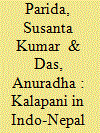| Srl | Item |
| 1 |
ID:
182085


|
|
|
| 2 |
ID:
059469


|
|
|
|
|
| Publication |
New Delhi, Archives books, 1989.
|
| Description |
135p.
|
|
|
|
|
|
|
|
|
|
|
|
Copies: C:1/I:0,R:0,Q:0
Circulation
| Accession# | Call# | Current Location | Status | Policy | Location |
| 030380 | 327.5405496/JHA 030380 | Main | On Shelf | General | |
|
|
|
|
| 3 |
ID:
077495


|
|
|
| 4 |
ID:
177296


|
|
|
|
|
| Summary/Abstract |
Nepal is an important neighbor of India and, due to the geographical, historical, cultural, and economic ties that span centuries, occupies special importance in its foreign policy. India has been a key development partner of Nepal. The latter received strong support and solidarity from the people and Government of India. India also Nepal’s largest trade partner and the largest source of foreign investments.
|
|
|
|
|
|
|
|
|
|
|
|
|
|
|
|
| 5 |
ID:
177289


|
|
|
|
|
| Summary/Abstract |
Power in International Relations (IR) is defined in relational terms, as the ability of actor A to influence the behavior of actor B to get the outcome he wants. (Blarel 2012). We can say there is no absolute power. The traditional focus of military and economic powers has undergone a change. However, some other intangible aspects have also been given importance by many strategic thinkers and foreign policy experts even in the past. The term Soft Power was first used and developed by the eminent neo-liberal scholar Joseph S. Nye Jr. His book “Bound to Lead: The Changing Nature of American Power” (Nye 2012: XI) has discussed that. He identified three dimensions of power; coercion by military force, influence by offering economic incentives and finally the ability to co-opt other states by the nation’s appeal based on its culture and values (Nye 2012: 2).
|
|
|
|
|
|
|
|
|
|
|
|
|
|
|
|